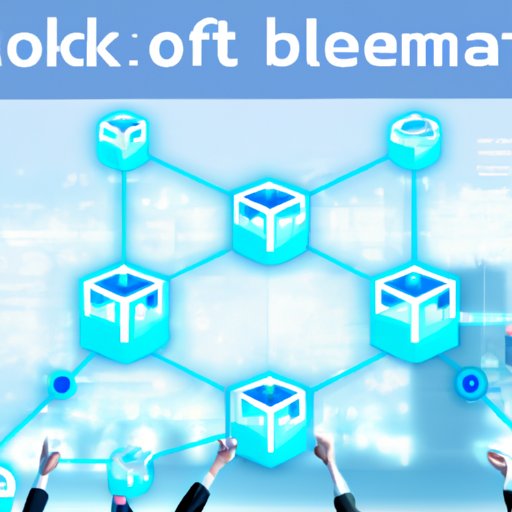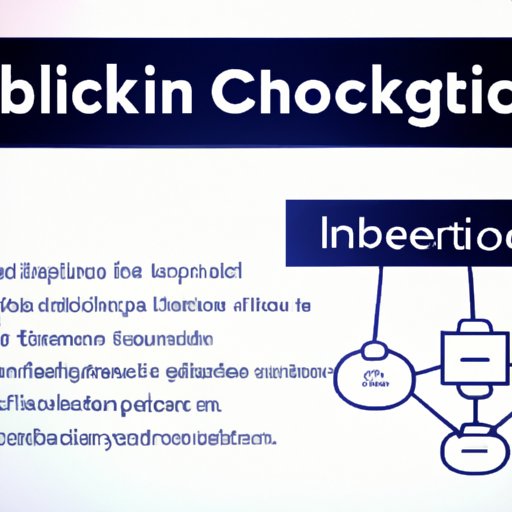Introduction
Blockchain is a revolutionary technology that has the potential to revolutionize many aspects of our lives. By allowing for secure, immutable, and decentralized transactions, blockchain technology can be used to facilitate a wide range of activities. In this article, we will explore how blockchain is being used in different industries, from finance to healthcare to government.
Exploring the Use of Blockchain in Financial Services
Financial services are one of the most prominent areas where blockchain technology is being implemented. Blockchain-powered solutions offer a number of advantages for financial institutions, including increased efficiency, improved transparency, and enhanced security. Furthermore, blockchain-based solutions can also reduce costs associated with certain activities, such as cross-border payments.
Examples of blockchain applications in the financial sector include digital wallets, asset custody solutions, and cryptocurrency exchanges. Digital wallets allow users to store and manage their funds securely, while asset custody solutions provide institutions with secure storage for digital assets. Cryptocurrency exchanges enable users to buy and sell digital currencies, providing an efficient way to invest in the digital currency market.
Understanding Blockchain-Based Smart Contracts
Smart contracts are self-executing agreements that are stored on a blockchain platform. They are powered by computer code and are designed to execute automatically when certain conditions are met. Smart contracts can be used to facilitate a wide range of transactions, from buying and selling goods and services to managing complex multi-party agreements.
The benefits of using smart contracts include greater trust and transparency, faster processing times, and cost savings. Smart contracts are also more secure than traditional contracts, as they are stored on an immutable ledger and cannot be altered or deleted.

Examining the Use of Blockchain in Supply Chain Management
Supply chain management is another area where blockchain technology is being utilized. Blockchain-based solutions can help to improve transparency and traceability in the supply chain, making it easier to track goods and materials as they move through the system. Furthermore, blockchain solutions can also help to reduce costs associated with certain activities, such as tracking and tracing.
By leveraging blockchain technology, companies can benefit from increased visibility into their supply chains, improved accuracy in their data, and reduced costs. Additionally, blockchain solutions can also help to reduce fraud and counterfeiting, ensuring that only genuine products reach consumers.
Analyzing Blockchain’s Impact on Healthcare
Blockchain technology is also having a significant impact on the healthcare industry. By leveraging blockchain solutions, healthcare providers can improve data security and accessibility, as well as reduce administrative costs. For example, blockchain technology can be used to securely store patient records, enabling medical professionals to access the data they need when and where they need it.
Additionally, blockchain-based solutions can also help to reduce the risk of medical errors, as well as improve the accuracy and reliability of medical data. This can help to reduce costs associated with medical treatments and improve overall patient outcomes.

Investigating the Use of Blockchain in Government
Blockchain technology is also being used in government to enhance services, reduce fraud and corruption, and streamline processes. By leveraging blockchain solutions, governments can improve the efficiency and accuracy of their operations, as well as reduce costs associated with certain activities. For example, blockchain can be used to securely store and manage public records, reducing the risk of fraud and ensuring that only valid documents are accepted.
In addition, blockchain-based solutions can also help to reduce the risk of corruption, as all transactions are recorded on an immutable ledger. This makes it difficult for anyone to tamper with the data or manipulate the system for their own gain.

Assessing the Potential of Blockchain for Voting
Blockchain technology has the potential to revolutionize the way we vote. By leveraging blockchain solutions, governments can ensure that elections are secure and transparent, as all votes are securely stored on an immutable ledger. Furthermore, blockchain-based voting systems can also reduce the cost and complexity of running elections, as well as make it easier to verify the results.
In addition, blockchain solutions can also help to create more efficient voting systems, as votes can be cast electronically and counted quickly. This can help to reduce the amount of time it takes to count the votes, as well as reduce the risk of fraud and manipulation.
Exploring Blockchain-Based Digital Identity Solutions
Blockchain technology can also be used to create secure digital identities. By leveraging blockchain solutions, companies can create secure and reliable digital identities for their customers. This can help to reduce the risk of fraud, as digital identities are stored on an immutable ledger and cannot be altered or deleted.
Examples of existing blockchain-based identity solutions include Civic and uPort. Civic enables users to securely store their personal information, such as driver’s license and passport details, on the blockchain. uPort is a decentralized identity platform that allows users to control access to their personal data, as well as securely store and manage their digital identity.
Conclusion
As this article has demonstrated, blockchain technology has the potential to revolutionize many aspects of our lives. From finance to healthcare to government, blockchain solutions can offer a number of benefits, including improved efficiency, increased security, and cost savings. As the technology continues to evolve, the range of applications for blockchain solutions is likely to expand even further.
(Note: Is this article not meeting your expectations? Do you have knowledge or insights to share? Unlock new opportunities and expand your reach by joining our authors team. Click Registration to join us and share your expertise with our readers.)
